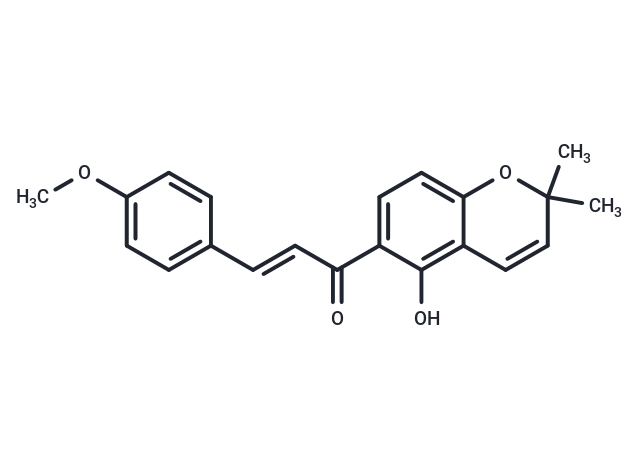Shopping Cart
- Remove All
 Your shopping cart is currently empty
Your shopping cart is currently empty

4-methoxylonchocarpin was isolated from the roots of Abrus precatorius as a potent anti-inflammatory compound. 4-methoxylonchocarpin inhibited NF-κB-activated TNF expression by inhibiting the binding of LPS to TLR4 in macrophages and suppressed TNBS-induced colitis in mice.

| Pack Size | Price | Availability | Quantity |
|---|---|---|---|
| 1 mg | $195 | In Stock | |
| 5 mg | $490 | In Stock | |
| 10 mg | $715 | In Stock | |
| 25 mg | $1,090 | In Stock | |
| 50 mg | $1,480 | In Stock |
| Description | 4-methoxylonchocarpin was isolated from the roots of Abrus precatorius as a potent anti-inflammatory compound. 4-methoxylonchocarpin inhibited NF-κB-activated TNF expression by inhibiting the binding of LPS to TLR4 in macrophages and suppressed TNBS-induced colitis in mice. |
| In vitro | The roots of Abrus precatorius (AP, Fabaceae) have traditionally been used in Vietnam and China for the treatment of inflammatory diseases such as stomatitis, asthma, bronchitis, and hepatitis. In this study, we isolated 4-methoxylonchocarpin (ML). In lipopolysaccharide (LPS)-stimulated macrophages, ML was found to inhibit nuclear factor (NF)-κB activation and tumor necrosis factor (TNF) and interleukin (IL)-6 expression by inhibiting LPS binding to Toll-like receptor 4 (TLR4) in vitro.[1] |
| In vivo | Oral administration of 4-methoxylonchocarpin (ML) in mice with TNBS-induced colitis suppressed colon shortening and colonic myeloperoxidase activity. ML treatment significantly inhibited the activation of nuclear factor (NF)-κB and phosphorylation of transforming growth factor β-activated kinase 1 in the colon. Treatment with ML also inhibited TNBS-induced expression of IL-1β, IL-17A, and TNF. While ML reduced the TNBS-induced expression of M1 macrophage markers such as arginase-2 and TNF, it was found to increase the expression of M2 macrophage markers such as arginase-1 and IL-10. In conclusion, oral administration of ML attenuated colitis in mice by inhibiting the binding of LPS to TLR4 on immune cells and increasing the polarization of M1 macrophages to M2 macrophages.[1] |
| Molecular Weight | 336.38 |
| Formula | C21H20O4 |
| Cas No. | 51589-67-4 |
| Smiles | OC1=C2C(OC(C)(C)C=C2)=CC=C1C(/C=C/C3=CC=C(OC)C=C3)=O |
| Relative Density. | 1.193 g/cm3 (Predicted) |
| Storage | store at low temperature | Shipping with blue ice. |

Copyright © 2015-2025 TargetMol Chemicals Inc. All Rights Reserved.